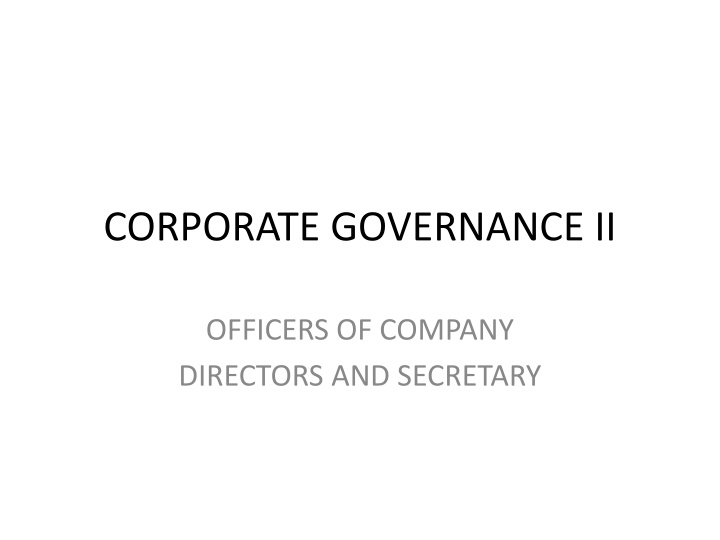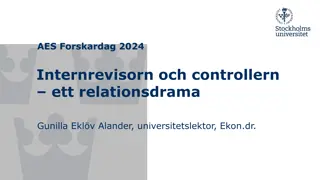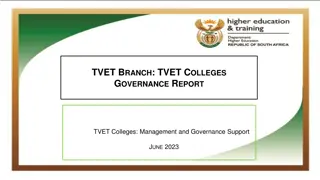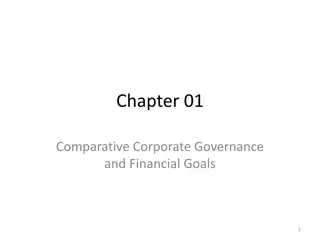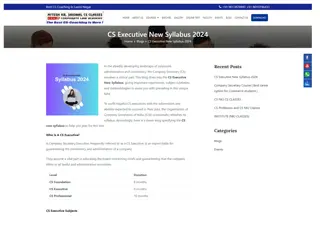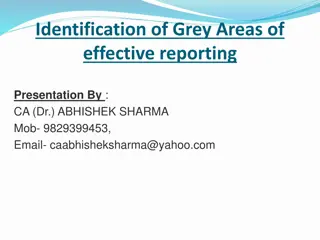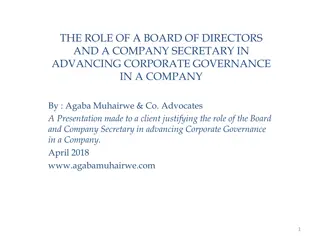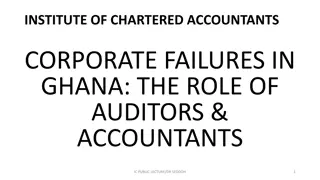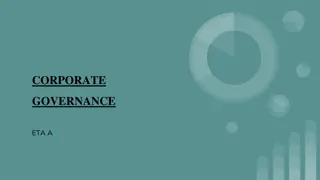CORPORATE GOVERNANCE II
In-depth explanation of the roles and responsibilities of company officers, directors, and the secretary according to the Companies and Allied Matters Act (CAMA). It discusses the exercise of company power, different types of directors, including executive and non-executive directors, managing directors, and more.
Download Presentation

Please find below an Image/Link to download the presentation.
The content on the website is provided AS IS for your information and personal use only. It may not be sold, licensed, or shared on other websites without obtaining consent from the author.If you encounter any issues during the download, it is possible that the publisher has removed the file from their server.
You are allowed to download the files provided on this website for personal or commercial use, subject to the condition that they are used lawfully. All files are the property of their respective owners.
The content on the website is provided AS IS for your information and personal use only. It may not be sold, licensed, or shared on other websites without obtaining consent from the author.
E N D
Presentation Transcript
CORPORATE GOVERNANCE II OFFICERS OF COMPANY DIRECTORS AND SECRETARY
EXERCISE OF COMPANYS POWER A company shall act through its: Members in general meeting OR Board of directors OR Officers or agents appointed by or under authority derived from the members in general meeting or the board of directors Section 63(1) Companies and Allied Matters Act (hereinafter referred to as CAMA )
DIRECTORS WHO IS A DIRECTOR? Section 244(1) CAMA- A person duly appointed To direct and manage the business of the company Section 567(1) Section 245(1)- Shadow directors Who is not a director? Section 245(3) Professionals giving advice to directors are not within the purview of Section 245(1).
DIRECTORS Directors of company are persons duly appointed by the company to direct and manage the business of company regardless of the nomenclature assigned to them. (Eg Governor, Manager, ETC) S. 250 (1) CA 2006: Directors includes any person occupying the position director by whatever called; and includes any person in accordance with those directions or instructions the directors of the company are accustomed to act
TYPES OF DIRECTORS EXECUTIVE NON EXECUTIVE MANAGING DIRECTOR CHAIRMAN FIRST DIRECTOR CASUAL DIRECTOR ALTERNATE DIRECTOR SHADOM DIRECTOR LIFE DIRECTOR NOMINEE DIRECTOR
TYPES OF DIRECTORS EXECUTIVE DIRECTOR Full timed or salaried Day to day running of a company affairs Employees of the company Operate under a Contract of Service
2. NON EXECUTIVE DIRECTORS There are directors appointed without any additional administration role assigned to them. They only operate as alter ego of the company. S 247, 248 & 249 Not employees of the company. Attend Board Meeting when fixed. They are not paid salaries but only reimbursed for out of pocket expenses
3. MANAGING DIRECTOR The Managing Director (MD) = Chief Executive Officer (CEO) of the company. Sees to the day to day administration of the company. A Managing Director combines the position of a director (alter ego) and of employee/ servant of the company S. 64 (b) CAMA provides that, the board of directors may from time to time appoint one or more of their body to the office of managing director and may delegate any of their powers to such managing directors
4. CHAIRMAN OF THE BOARD OF DIRECTORS The chairman of the Board of Directors is also the chairman of the company Presides over both the Board meeting and the General Meeting of members. He is appointed by the Board of Directors from among the Board S. 263 (4) NB: Power & Privileges of Chairman
5. ALTERNATE DIRECTOR Alternate Director who is appointed to take the position of another director in the event of absence. It is the director that appoints his alternate but is approved by the Resolution of the General Me. There must be a provision in the article of association of the company recognizing the possibility of creating this position. The Alternate Director Ceases to hold office whenever the substantive Director ceases to hold office
6. SHADOW DIRECTOR This type of directors is not formally appointed. The test is that the BOD of the company is accustomed to act on the instruction and directions of the person who operates from out side the company. S 245 At what point can someone be reckoned as a shadow director? Single act? Sec of State v. Becker One is considered a shadow director for the limited purpose as provided in Ss 253, 275 CAMA It arises when considering the above sections only. As such, a person cannot come and say that he is a shadow director just to claim benefit accruing to the company.
7. NOMINEE DIRECTOR Where a company is a director in another company, the company is obliged to appoint a nominee to represent it in the Board for a fixed period Upon filling returns at CAC, the company files the name of the representative of the Director company Section 257 (d) provides that the following persons shall be disqualified from being director () a corporation other than its representative appointed to the board for a given term
8. LIFE DIRECTOR S. 255 CAMA empowers the company to appoint a person director for life. A life Director may be removed in accordance with S. 262 and under S. 258 (1) WHAT THEN IS THE ADVANTAGE OF BEN A LIFE DIRECTOR? the major advantage is that a life director is exempted from retirement by rotation.
9. FIRST DIRECTORS The initial Directors not less than 2 The First directors of a company shall be determined by subscribers of the memorandum of Association; or may be named in the article. S. 247 Complete Form CAC 7
10. CASUAL DIRECTOR Where there is a vacancy arising out of death, resignation, retirement, or removal of a Director, BOD shall appoint new person to fill any such casual vacancy subject to approval by the members/ till the next GM S.249 (1) (2) The new appointee steps into the shoes of the removed or dead or resigned director. He merely enjoys the unexpired residue of the term of the initial director. And will retire where the rotation rule applies at the time the person he replaced ought to have retired. S. 249(2)
OTHERS INTERLOPER ASSIGNEE
NUMBER OF DIRECTOR The minimum numbers of directors for any registered company in Nigeria is not less than two S. 246 (1) at all times and maximum as may be stated in the Article of the Company. m Where the number falls below the legal minimum, the company shall within one month appoint new director and shall not carry on business after the expiration of that month unless new directors are appointed S. 246 (2)
VARIATION OF NUMBER OF DIRECTORS: BY: Directors- Power to increase only subject to articles The members in general meeting- power to increase or reduce Section 249(3)
APPOINTMENT OF DIRECTOR APPOINTMENT OF FIRST DIRECTOR 1. Stated in writing by all or majority of subscribers to the MEMO 2. Named in the Article of Association. Sec 41(3) CASUAL DIRECTOR BOD PENDING THE NEXT GENERAL MEETING
APPOINTMENT OF SUBSEQUENT DIRECTORS 1. GM 2. NAMED A PERSON By Ordinary Resolution Unless in a private company, two or more directors cannot be appointed by a single resolution, unless again a resolution had earlier been unanimously passed by the general meeting to that effect. S 261(1)
AUTOMATIC RE-ELECTION OF RETIRING DIRECTORS A director who has retired in the manner prescribed in section 259(1) and (2) may be automatically re-elected if: The vacancy caused by his retirement is not filled by the election of another person into that office The director offers himself for re-election It has not been expressly resolved not to fill such vacated office and a resolution for the re-election of such director was not put at the meeting and lost A record of his attendance at the meetings of the board during the preceding one year is made available to members at the general meeting where he is to be re-elected SECTION 258(2)
Filling of vacancy caused by retirement of directors- section 259 Supposing there was no automatic re-election, the vacancy could be filled by: A person recommended by the BOD without a need for notice to pass the resolution required to be given to members A written notice signed by a member and deposited at the company s registered office or head office within 3-21 days of the proposed meeting in addition to a notice of his willingness to be elected
DISQUALIFICATION FOR DIRECTORSHIP Sec 257 disqualified under S253, 254, & 258 I. An infant: person under the age of 18 years II. A lunatic or person of unsound mind III. Corporate Body other than its representative appointed to the board after a given term. IV. S. 253 prohibits insolvent persons V. S. 254 restrains person who have been convicted of fraudulent practices in relation to company matters by the Court, from taking part in the management of a company for a specified period not more than 10 years
VACATION OF OFFICE OF DIRECTORSHIP Se 258 provides 5 circumstances 1. cease to be a director by S 251 i.e. share qualification 2. bankruptcy 3. insanity 4. resignation 5. becomes prohibited by Order of Court under S 254. Automatic , and cannot be waived.
AGE OF DIRECTOR A Director must be above 18 years of age. In respect of public company a person to be appointed a director who is 70 years or more shall disclose this fact to members in general meeting by special notice. The notice must state the exact age, and must be given to the company. Section 252 In the case of Private Company? No notice is required.
DUTIES OF DIRECTORS By S.283(1) CAMA, the basic legal position of Directors is that they are trustees of the company as well as its agents. The duties of Directors are classified into two broad headings Fiduciary Duties Duties of care and skill
FIDUCIARY DUTIES Directors owe fiduciary duties to the following persons: i. Company to which it must observe utmost good faith in any transaction with it or on its behalf. ii. Shareholders when acting as shareholders agent iii. Shareholder in any transaction affecting his interest iv. Any person dealing with the company s securities Se 279(1) (2)
The fiduciary duties of Directors are Duty to act bona fide for the benefit of the company Exercise power for proper purpose Not to fetter discretion to vote in a particular way To avoid conflict of duty and interest Not to make secret profits by appropriating corporate assets or opportunities Duty to act bona fide for the benefit of the company
A director shall act at all times in what he believes to be the best interest of the company as a whole, so as to preserve its assets, further its business, and promote the purposes of how it was formed, and in such manner as a faithful, diligent careful and ordinary skillful director would act in the circumstances Section 279(3) Artra Ind. Nig. Ltd v. Nigerian Bank for Commerce & Industry The interest of employees and members is to be considered S. 279(4
Duty to exercise Power for a proper purpose A director shall exercise his power for the purpose for it is specified and shall not do so a collateral purpose. However, such powers when exercised for proper purpose is valid even if it incidentally affects a member adversely. Section 279 (5) Duty not to fetter discretion to vote in a Particular way.
A director is a trustee of the company, as such he shall not exercise his discretion to vote in a particular way with the consent of the company, being the Beneficiary. S 279(6) Therefore, a Director cannot make a valid agreement with shareholders or outsiders to vote in a particular way at Board meetings.
Duty to avoid conflict interest The personal interest of a director shall not conflict with his duties as a director . Se 280 (1) I. Any director of a company who is in any way whether directly indirectly, interested in a contract or proposed contract with the company, shall declare the nature of his interest at a meeting of the directors of a company .S 277 (1)
2. For a proposed contract, the director shall declare his interest at a Board meeting where the contract was first considered, where not interest on that date, the next meeting held after he became so interested . Sec 277 (2) NB: A director is prohibited from entering into guarantee or provision of security. Section 270 3. Payments made to a director by way of compensation for loss office or retirement must be disclosed to members in general meeting and approved by them Sec 273 (3)
4. A director is restricted from the acquisition of non-cash asset of the company without approval by resolution of general meeting S 284 5. However, if the gift is unsolicited in the form of gratitude after the transaction has been completed, the Director may be allowed to keep the gift provided he declares it before the Board, the Board s decision approving his keeping the gift are to be entered in the Minutes Book of Directors. Section 287 (3)
6. Directors are not allowed, either during or after the termination of their service with the company to use for their own benefit anything, property, trade secret or confidential information entrusted in them by virtue of their position 7. Duty also extends to officers who have access to such information. 8. The fact that a person holds multiple directorship shall not derogate from his fiduciary duties to each company; he is not to use information from one company to the advantage of the other company .Se 281
DUTIES OF CARE AND SKILL Under the Common law, a Director need not exhibit the performance of his duties with a greater degree of skill than may reasonably be expected from a person of his knowledge and experience, he is not bound to give continuous attention to the affairs of his company Re City Equitable Fore Insurance Company
OBJECTIVE/SUBJECTIVE? The director shall exercise the powers and discharge his duties in good faith in the best interest of the company and shall exercise that degree of care, diligence and skill which a reasonable, prudent director would exercise in comparable circumstances Failure to take reasonable care can ground an action against the director for negligence and breach of duty S. 282(2) Section 282 (3) Every Director is individually responsible for actions of the Board in which he is a member. His absence unless justified does not relieve him of such responsibility
Consequences of Breach of Duty not to Make Secret Profit The director shall be accountable to the company for any secret profits or unnecessary benefit derived by him S. 280 (3) The director may be sued by the company to recover such secret profit or benefits S. 287 (3) It does not matter that the Director acted bona fide
REMEDIES (i) Termination /Removal (ii) Injunction (iii) Damages (iv) Rescission & restoration of company s assts if traceable (v) Account for profit section 279(5) precludes any exemption from liability which may be inserted in the articles or Resolution or Contract of the company
REMUNERATION OF DIRECTORS Generally every director of a company acts gratuitously. They are not entitled to remuneration for services rendered to the company. Where a director is to be entitled to remuneration it must be expressly stated in the Articles and services contracts .Section 267 (4) A company shall not be bound to pay remuneration to directors, but where it agrees to pay, it shall pay out of the company s funds. Where remuneration is fixed in the Articles it can only be altered by special resolution Section 267 (3)
The remuneration of directors shall be determined from time to time by the members in general meetings and shall be deemed to accrue from day to day- Section 267 (1) However, Directors may be paid for out of pocket expenses ie travelling, hotel and other expenses properly incurred in attending meetings or in connection with business of the company Section 267 (2)
Directors remuneration is also apportionable Section 267 (7) A director who receives more money than his entitled to shall be guilty of misfeasance and shall be accountable to the company for such money- 267(6)
REMUNERATION OF MANAGING DIRECTOR The managing Director s remuneration is automatic upon appointment and is not subject to Articles or general meeting. Thus, a managing Director SHALL receive such remuneration (whether by way of salary, commission or participation in profit or partly in one way and partly in another) as the directors may determine A managing director s remuneration is taxable under S. 269 CAMA he shall be entitled to payment Quantum where he performs such service without a contract. S 268 (3)
RETIREMENT & ROTATION OF DIRECTIONS At the first Annual General Meeting (AGM) of the company, all the Directors shall retire from office, and at subsequent AGM, of the Directors or the number nearest to 1/3 shall retire from office SECTION 259 (1) Retirement is by rotation according to the number of years spent as director in office, those who have been longest in office at their last election shall retire [first in first out] Where two or more directors are appointed the same day, retirement shall be by casting a lot unless they agree among themselves who should retire
S 259 (2) Where a director at retirement present himself for RE- ELECTION then whether the company is silent or not, he is deemed to have been re-elected as a director, unless there is resolution shifting the vacancy or rejecting him or another director has been elected in his place = Where he is deemed to be reelected as a director, he is the newest in office A person appointed to replace or removed director continues the tenure of the person removed. Thus he will be caught by FIFO S. 262 (5)
EXCEPTION TO RETIREMENT AND ROTATION RULE If the Article of Association exempt the rule S. 259 A Life Director is not affected by the rule
BOARD MEETINGS- S.263 Time to hold first board meeting Notice of meeting- S.266. Longe v FBN (2010) 6NWLR (pt. 1189) SC 1 Mode of voting is by simple majority- S. 263(2), (7), (9) cf by proxy for members at general meetings Power of a director to requisition a meeting of directors 263(3) Written resolutions of directors operating validly as though passed at a meeting of directors duly convened- S263(8)
CHAIRMAN Board chairman- S. 263(4) Chairman at the general meeting Committee chairman- S.263(6) Power of directors to appoint chairman where there is no substantive one or where he is not present within five minutes after time- 263(4), (6) Powers of chairman- Casting vote to break a tie
QUORUM BOARD QUORUM- S. 264 2 where number does not exceed 6 1/3 of the directors or 1/3 to the nearest number COMMITTEE QUORUM As determined by the board and where not so decided, all members shall meet Effect where a quorum cannot be formed in the board meetings and in the committee meetings- S.265
REMOVAL OF DIRECTORS All directors, whether executive, non executive or even Life director may be removed from office, notwithstanding any protective clause in any agreement or Article of Association of the company Can the Board of Directors remove their fellow Director? The power to remove a director is vested only in the members in the General meeting. Thus, the Board of Director has no power to remove or suspend a fellow Director
